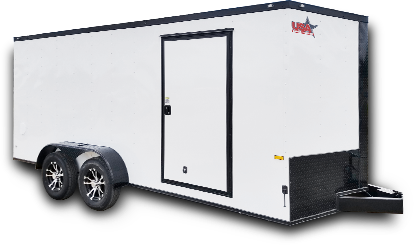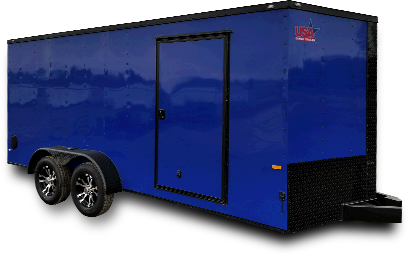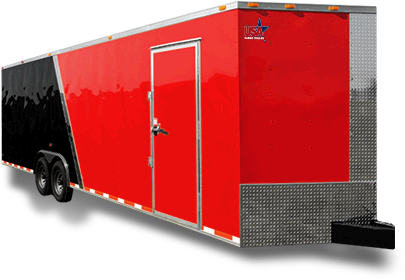Make Sure You Have the Right Tools for the Job
There’s more to hauling something — whether it’s a motorcycle or a boat — than simply having a trailer and a vehicle to haul it. The right trailer hitch is essential to safely hauling your load, and that means you need to understand the various trailer hitch classifications.
A trailer hitch that isn’t the right fit for the load you’re hauling can be a disaster. The hitch may not be the right size for the vehicle you’re driving, or it may not be strong enough to safely carry your load. Either way, having the wrong trailer hitch can create a dangerous situation on the road for you and other drivers, as well as cause delays and extra expenses.
Before hitching up your trailer, review the trailer hitch classes guide on this page. This information is provided to help you understand what hitch is right for your vehicle and your load.
Class 1 Hitch Size
Although this is the lightest classification, Class 1 trailer hitches are used to haul light loads. These hitches are suitable for use on most passenger cars and light crossover vehicles. They can pull up to 2,000 pounds, making them the wrong choice for pulling any of our cargo trailers. Max tongue weight 200 lbs.
Class 2 Hitch Size
These hitches do a bit more heavy lifting than Class 1 hitches. Class 2 trailer hitches are too much for a small passenger car and require a midsized sedan, a small truck or a minivan to haul a trailer. Because they can pull up to 3,500 pounds, Class 2 hitches are ideal for hauling equipment such as snowmobiles, lightweight boats and small single axle trailers with a gross trailer weight of 3500 or less. Max tongue weight 300 lbs.
Class 3 Hitch Size
Class 3 hitches require a more robust vehicle for hauling, such as a pickup truck, a full-size SUV or a minivan. With a trailer weight capacity of 3 tons or 6,000 pounds, this is the class of trailer hitch you need to haul midsized boats or small campers as well as some trailers with GTW of 6,000 or less. Max tongue weight 600 lbs.
Class 4 Hitch Size
Class 4 trailer hitches should not be used on vehicles smaller than heavy-duty pickups or large SUVs. These hitches are suitable for hauling loads up to 10,000 pounds, including large campers and large boats. If you buy a cargo trailer with a gross trailer weight of 10,000 (2-5000 lb. axles) you will need at least a Class 4 hitch. Max tongue weight 1,000 lbs.
Class 5 Hitch Size
Class 5 trailer hitches do the real heavy work, hauling full-size campers, large boats and equipment trailers. Capable of hauling trailers exceeding 10,000 pounds in weight, Class 5 hitches are suitable for commercial trucks and other heavy-duty vehicles. Class 5 hitches are weight carrying (WC) and weight distributing (WD) hitches depending on the vehicle and hitch specifications. Class 5 hitches used as weight carrying are rated up to 12,000 lbs. gross trailer weight (GTW) with a maximum trailer tongue weight (TW) of 1200 lbs. Class 5 hitches used for weight distributing are rated up to 17,000 lbs. gross trailer weight (GTW) with a maximum trailer tongue weight (TW) of 1700 lbs.
Summary
Its great to have a heavy duty vehicle and a hitch that can handle almost anything. Most don’t and you might be surprised at how many people do not know what their vehicle can tow or what their hitch can handle. For safe towing learn before you tow.
Step 1- Refer to your vehicles owners manual for the towing capacity.
Step 2- Calculate the weight of cargo your hauling, including trailer weight.
Step 3- Have the right trailer axles to handle the load.
Step 4- Make sure you have the correct trailer ball for the job.
GVW 3500 lbs. (1-3500 lb. axle) use a class 3 hitch
GVW 7000 lbs. (2-3500 lb. axles) use a class 4 hitch
GVW 10,000 lbs. (2-5000 lb. axles) use a class 4 or 5
GVW 12,000 lbs. (2-6000 lb. axles) use a class 5 hitch.
Your ball mount and hitch ball need to both be rated for Class 5 to safely tow these weight loads. To use this class of hitch for weight distribution requires a weight distribution system. A Class V hitch has a 2-1/2″ square receiver opening. Class 5 hitches attach to the vehicle frame only.
Trailer Hitch Classifications at a Glance
We’ve created a useful chart that illustrates the best trailer hitch for your vehicle and what you’re towing. Before you haul anything, view this easy-to-read graphic to make sure you have the right hitch for the job.



